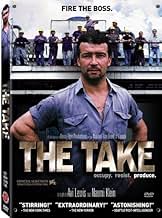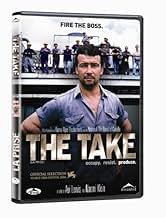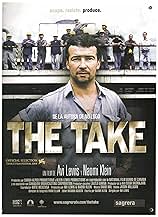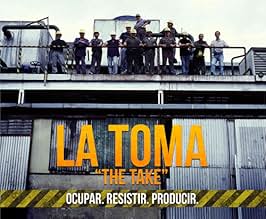ÉVALUATION IMDb
7,6/10
1,2 k
MA NOTE
Ajouter une intrigue dans votre langueIn the wake of Argentina's economics collapse of 2001, factory workers break into abandoned factories and restart production. Could these pioneers of cooperative ownership be a model for reb... Tout lireIn the wake of Argentina's economics collapse of 2001, factory workers break into abandoned factories and restart production. Could these pioneers of cooperative ownership be a model for rebuilding Argentina's economy?In the wake of Argentina's economics collapse of 2001, factory workers break into abandoned factories and restart production. Could these pioneers of cooperative ownership be a model for rebuilding Argentina's economy?
- Prix
- 1 victoire et 5 nominations au total
Bill Clinton
- Self
- (archive footage)
Gustavo Cordera
- Self (singer)
- (as Bersuit)
Carlos Saúl Menem
- Self
- (as Carlos Menem)
Juan Domingo Perón
- Self
- (archive footage)
Avis en vedette
10protek22
The Take is one of the most informative economic and political documentaries currently available. The issues Ms. Klein and her colleagues chronicle, are of extreme importance for anyone seeking to gain a factual understanding of today's most pressing economic and political issues. Argentina had been a poster child for the globalization and neoliberal economic policies promoted by the U.S., the World Bank, and the IMF. While these policies are still being widely hailed by the mainstream media as the wave of the future, their truly destructive nature is actually understood by very few. This film allows the viewer to witness the catastrophic economic and political challenges that brought Argentina to it's knees, and the inspired solution implemented by Argentinian workers, as they rallied from the depths of economic and political despair, to redeem themselves from the clutches of corrupt politicians, and global financiers.
No one is more rad-chic than Naomi Klein, with her cool war-resister parents, alternative doctor father and militant feminist mother. She crossed Canada at 16 years old campaigning against nuclear power and wrote a hit book attacking globalisation in her 20s.
Now she has made a feel-good movie out of the economic catastrophe that hit Argentina, by following the weary campaign of unemployed steel workers to join a couple of hundred other factory occupations and take control of their abandoned steel works.
Klein and spouse Avi Lewis were in Argentina for some six months, with a crew of 16 and a budget of about C$1m, so we could certainly expect results. Whether this resounding endorsement of worker co-ops (slogan: Fire The Boss) is quite what the NFB had in mind is not clear.
At a couple of points, I felt the film ruined Argentina offered was about the repulsive imp Carlos Menem and the murderous bourgeois traitors he represented. Who is going to purge those secret policemen who rubbed out some 30,000 lefties? When are those generals going to face a court? Why was Menem not in prison instead of running for president? But the survival tactics of the workers on the ground was a more humane story, and that is to Klein's credit.
Now she has made a feel-good movie out of the economic catastrophe that hit Argentina, by following the weary campaign of unemployed steel workers to join a couple of hundred other factory occupations and take control of their abandoned steel works.
Klein and spouse Avi Lewis were in Argentina for some six months, with a crew of 16 and a budget of about C$1m, so we could certainly expect results. Whether this resounding endorsement of worker co-ops (slogan: Fire The Boss) is quite what the NFB had in mind is not clear.
At a couple of points, I felt the film ruined Argentina offered was about the repulsive imp Carlos Menem and the murderous bourgeois traitors he represented. Who is going to purge those secret policemen who rubbed out some 30,000 lefties? When are those generals going to face a court? Why was Menem not in prison instead of running for president? But the survival tactics of the workers on the ground was a more humane story, and that is to Klein's credit.
the worker owned factories in argentina are one of the best developments in recent history. i think the most interesting part of it is that people who are not ostensibly "political" have responded to a crisis by instituting something, spontaneously, that looks like it is within spitting distance of anarchosyndicalism. joe hill would be proud.
i saw this film as part of the touring show for the lost film festival, and it was easily the highlight of the show. I'm eagerly awaiting this to come to a local theater so i can see it again, and i'm going to try to get as many people as possible to go.
i saw this film as part of the touring show for the lost film festival, and it was easily the highlight of the show. I'm eagerly awaiting this to come to a local theater so i can see it again, and i'm going to try to get as many people as possible to go.
namely that there ARE options available to us all.
8/10 for the message of hope, commiseration for our working/unemployed Argentine brothers and sisters.
6/10 for the quality of the film.
there is so much unhappiness among the people of the world that ARE working, let alone those suffering war, poverty/sickness. Billions of workers' tax dollars bailing out banks and corporations, as decisions by the politicians of canada and the u.s.?!? You need to wake up if you do not realize the intent behind such policies. Why do so many people continue to accept idiotic and heartless "bosses" in the workplace? Their positions of power are supported by fear, and violence. We NEED movies like this at the very least to show us all the glimmer of light at the end of OUR long, dark tunnel..
the direct democracy worked towards by the people filmed here, is the democracy i believe in. for me the most important lesson here is that the workers succeeded with the support of their Community.
great things are possible when we work together.
Occupy.Resist.Produce!
Horizontalidad!!
8/10 for the message of hope, commiseration for our working/unemployed Argentine brothers and sisters.
6/10 for the quality of the film.
there is so much unhappiness among the people of the world that ARE working, let alone those suffering war, poverty/sickness. Billions of workers' tax dollars bailing out banks and corporations, as decisions by the politicians of canada and the u.s.?!? You need to wake up if you do not realize the intent behind such policies. Why do so many people continue to accept idiotic and heartless "bosses" in the workplace? Their positions of power are supported by fear, and violence. We NEED movies like this at the very least to show us all the glimmer of light at the end of OUR long, dark tunnel..
the direct democracy worked towards by the people filmed here, is the democracy i believe in. for me the most important lesson here is that the workers succeeded with the support of their Community.
great things are possible when we work together.
Occupy.Resist.Produce!
Horizontalidad!!
The collapse of Argentina's peso in 2001 threw millions out of work and plunged what had been one of Latin America's most prosperous countries in the 1990s into the kind of economic depression not seen in the United States since the 1930s. Four years later thousands of ruined businesses remain closed. In a handful of cases, though, workers occupied and reopened shut factories, health clinics, and schools as employee-owned and operated- cooperatives.
How Argentine workers did this is a terrific story. Unfortunately, "The Take", a film directed and narrated by anti-globalization activists Naomi Klein and Avi Lewis raises more questions than it answers.
According to Klein and Lewis, Argentine workers now run more than 200 companies employing 15,000 people. To explain how this happened, the movie documents a campaign by unemployed machinists to put a casting parts plant back in business. Along the way, we see examples of other successful cooperatives, including a shop of seamstresses, a ceramic tile manufacturer, and a tractor factory.
The new worker owners featured in "The Take" are earnest and enthusiastic. They are especially moving when describing the effects of years of unemployment and how their lives have improved for the better after returning to work. No one, though, tells us basic facts about these companies, such as whether wages and benefits have gone up or down under cooperatives, how the worker-owned companies pay for their raw materials, who buys their products, and if they make a profit. These are not idle points, as any owner Argentine worker or multinational plutocrat -- knows.
How does the "The Take" fill up its time? In between interviews with cooperative members about the glories of worker control we get lectures about the lack of differences among candidates in the 2003 Argentine presidential election, the pointlessness of voting, and the failings of the International Monetary Fund. We're also treated to a long slow motion sequence of a street riot in Buenos Aires complete with Mercedes Sosa soundtrack -- that depicts heroic workers and the equally heroic Klein and Lewis calling each other on their cell phones.
There's a good documentary to be made about what has happened to Argentina's economy and its workers. Klein and Lewis, however, take the easy way out and give us slogans and mushy analysis that leave the audience skeptical and suspicious.
4/10
How Argentine workers did this is a terrific story. Unfortunately, "The Take", a film directed and narrated by anti-globalization activists Naomi Klein and Avi Lewis raises more questions than it answers.
According to Klein and Lewis, Argentine workers now run more than 200 companies employing 15,000 people. To explain how this happened, the movie documents a campaign by unemployed machinists to put a casting parts plant back in business. Along the way, we see examples of other successful cooperatives, including a shop of seamstresses, a ceramic tile manufacturer, and a tractor factory.
The new worker owners featured in "The Take" are earnest and enthusiastic. They are especially moving when describing the effects of years of unemployment and how their lives have improved for the better after returning to work. No one, though, tells us basic facts about these companies, such as whether wages and benefits have gone up or down under cooperatives, how the worker-owned companies pay for their raw materials, who buys their products, and if they make a profit. These are not idle points, as any owner Argentine worker or multinational plutocrat -- knows.
How does the "The Take" fill up its time? In between interviews with cooperative members about the glories of worker control we get lectures about the lack of differences among candidates in the 2003 Argentine presidential election, the pointlessness of voting, and the failings of the International Monetary Fund. We're also treated to a long slow motion sequence of a street riot in Buenos Aires complete with Mercedes Sosa soundtrack -- that depicts heroic workers and the equally heroic Klein and Lewis calling each other on their cell phones.
There's a good documentary to be made about what has happened to Argentina's economy and its workers. Klein and Lewis, however, take the easy way out and give us slogans and mushy analysis that leave the audience skeptical and suspicious.
4/10
Meilleurs choix
Connectez-vous pour évaluer et surveiller les recommandations personnalisées
Détails
- Date de sortie
- Pays d’origine
- Sites officiels
- Langues
- Aussi connu sous le nom de
- Захват
- Lieux de tournage
- sociétés de production
- Consultez plus de crédits d'entreprise sur IMDbPro
Box-office
- Brut – États-Unis et Canada
- 30 380 $ US
- Fin de semaine d'ouverture – États-Unis et Canada
- 8 625 $ US
- 26 sept. 2004
- Brut – à l'échelle mondiale
- 30 380 $ US
- Durée
- 1h 27m(87 min)
- Couleur
Contribuer à cette page
Suggérer une modification ou ajouter du contenu manquant


















